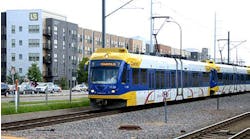The project Improve Life to improve air quality in the metro, has made this January its first steps installing air quality measuring equipment at a station on the Line 5 of the Barcelona system.
The aim of the project, promoted and managed by the CSIC and TMB, is assessing air quality in the metro facilities and proposing measures to achieve cleaner public transportation, thus benefitting both users and employees. The project is co-financed by Life + Environment, Policy and Governance of the European Commission.
From now on until September 2016, a dozen campaigns will be held to collect samples at various points of the metro in Barcelona. The concentration levels of airborne suspended microparticles (PM) as well as their chemical composition will be determined both at stations and inside the trains. Measurements will be done both under normal situations and when performing activities that generate dust, such as the renovation work of the track, which take place regularly.
Some of the underground systems components susceptible to impact the environment will be analysed in the laboratory, such as brushes for electric motors, rails, brake pads, the stone ballast, electric wires and bands of contact for the catenary.
In a previous study, also conducted by researchers from the CSIC in co-operation with the TMB (between 2011 and 2012), it was found that the air in the underground contains contaminants from the external environment plus others resulting from processes such as the abrasion of the train wheels in contact with the rails, the cleaning and maintenance work. The data showed that particle levels are below the average for other metro networks with published data and vary depending on the characteristics of each station. For example, the air quality is best in the automatic lines with physical separation between train and platform, or inside the trains as a result of the permanent filtration of air through the air conditioning system.
Within the project Improve Life, a more thorough exploration of the atmosphere that permeates the underground stations will be conducted in order to propose measures to reduce the presence of particles harmful to health. For example it will be studied if: the application of a dry polymer to the ballast prevents dust generation during rail renovation works; the selection of equally effective different materials for brakes, wheels and catenaries can also be cleaner; the renewal of air in the tunnels through ventilation shafts located along the network can be improved.
The first sampling campaign is being carried out in the Sagrera station of line 5. The aim is to analyse the air quality before, during and after renovation work on the rail track, carried out in the proximity of the station.
The results of the study will be published and made available to public rail transport operators around the world, so that the recommendations can be applied in other networks beyond the metro in Barcelona.
The Improve project is supported by the EU Life program dedicated to promoting actions to protect the environment and conservation of nature and climate, which provides 50 percent of the total budget of €813,727.
The project Improve Life strengthens the co-operation between the Institute of Environmental Assessment and Water Research (IDAEA) of the Spanish Research Council for Scientific Research (CSIC) and Transports Metropolitans de Barcelona (TMB), the main operator for passenger transport in Catalonia, and one distinguished by the company's commitment to energy efficiency, reducing environmental impact, improving air quality and promoting a culture of sustainability.


